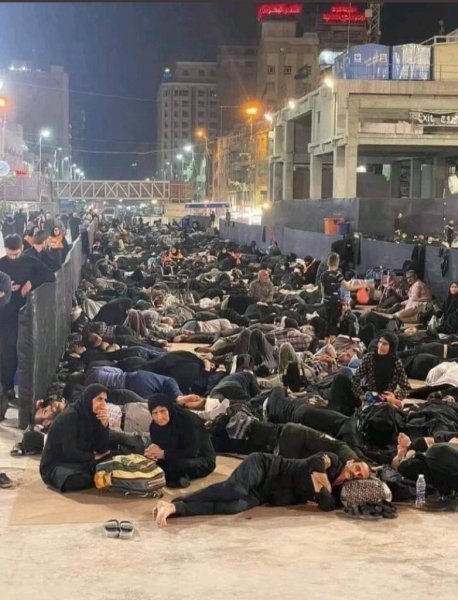Arbaeen 2022 Management in a Improvisational Manner
The mismanagement of Arbaeen 2022 once again became troublesome in an improvisational manner. The camera shows images of exhausted and desperate pilgrims lying on carpets with their families, including young children, in the heat, surrounded by disposable dishes and garbage. Another image shows a traffic jam of cars in Ilam heading towards the border, with people getting out of their vehicles and asking for water by the roadside. The chaos, the tragedy of at least 9 Iranian pilgrims dying, are terms used by domestic and foreign media to describe what is happening these days at the Iran-Iraq borders.
Two days ago, officials announced that due to worrying incidents at the Shalamcheh and Mehran borders and serious risks to the safety and health of pilgrims, all Iranian borders towards Iraq have been closed, and land travel for Arbaeen is canceled. No passports are being issued, and people are advised not to head towards the border. Now, the important question is what will happen to the millions of people currently gathered in the extreme heat behind the borders without access to basic sanitary services like clean drinking water, food, and shelter.
The crowd, hoping for a change in the situation, seemingly has no intention of returning. On the other hand, due to lack of facilities on the other side of the border, they cannot move forward either. One of the pilgrims who returned from the Iraq border says in a video interview published by the media, ‘Where are the advertisements that Iranian television makes? Where are the promises they made? There is nothing on the other side of the border—no water, no food, no transportation. They say pay 750,000 or one million tomans to take you to Karbala. Where are people supposed to get this money from?’
Management by Issuing Announcements
In these two days, the Arbaeen Headquarters has issued nearly 10 announcements. The question is, couldn’t they have prevented this situation by planning ahead instead of trying to manage it by issuing announcements? In one of the announcements, it was stated that due to weak infrastructure, lack of transportation for moving pilgrims at the border, and the wandering of Iranian pilgrims, the Arbaeen Headquarters has decided to close the six borders until the situation improves in Iraq to preserve the pilgrims’ health and return the border to normal.
It is said that the main concern of the officials was the massive crowd at the border and the slow movement on the other side, as Iraq did not have the capacity to accommodate all these pilgrims. Some Iranian pilgrims were stranded at that border for more than 6 to 7 hours waiting for transportation. It is claimed that Iran’s Arbaeen Headquarters had extensive negotiations with the Iraqi side, but despite all this, Iraqi officials have practically not fulfilled their commitments. The Arbaeen Headquarters has also asked pilgrims residing in Iraq to expedite their return and limit their stay in Karbala to no more than one day.
Whose Fault Is It?
Some say the blame lies with the 5 million toman loan that the government promised to the Karbala pilgrims, which led to a sudden increase in the number of people heading to the Karbala march. Others blame the excessive advertising that encouraged more people to go this year compared to previous years. Some say the reason is the end of COVID-19 and the many enthusiasts who couldn’t go to Karbala for two years.
Others blame the Iraqi government for not making the necessary arrangements to provide services and facilities to the pilgrims. Some say Iranian officials were negligent and did not coordinate with Iraqi officials about the large number of pilgrims expected this year. The Arbaeen Headquarters claims that coordination for the entry of this large number of pilgrims was made with Iraqi officials, but they have not fulfilled their commitments.
Hossein Maznabi, Director General of Performance Inspection and Citizens’ Rights of Iran’s Ministry of Roads and Urban Development, said regarding the cancellation of Arbaeen trips, ‘This decision was made at the request of Iraq because it does not have the capacity and facilities to accommodate this number of pilgrims.’
The question is whether the Iranian side had informed Iraqi officials beforehand that this year would see a multiple increase in pilgrims from the Iranian borders, or perhaps even the Iranian officials had no accurate information or prediction in this regard. Interestingly, no appropriate response or reaction has been observed from Iraqi officials regarding the situation so far.
Intercity Travel Halted
Improvisational management is most evident where, in the past two weeks, all intercity passenger services were disrupted due to the coincidence with Arbaeen. Passengers intending to travel between cities under normal circumstances faced the problem of a lack of buses.
Because all passenger buses from across the country were carrying passengers to Karbala. For example, if you needed to urgently travel to Tehran, Tabriz, Shiraz, Isfahan, etc., you faced the problem of no tickets and buses being available, not just for one or two days, but for the past two weeks, with intercity ticket sales portals almost closed. Passengers had to, if urgently needed, rent a car at a high cost or call out on social media for someone traveling by private car to their desired or common destination.
If willing or having space, that person could take them along as a travel companion. The government is responsible for providing fair and equal services to all citizens and cannot ignore the needs of others for the convenience of some. However, its improvisational management of this year’s Arbaeen ceremony resulted in both Karbala pilgrims being stranded and travelers to other cities not reaching their destinations.

